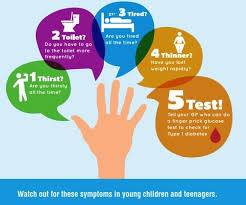Early Detection of Type 1 Diabetes in Children: A Critical Call for Parents
Diab
etes is a growing concern worldwide, and Type 1 diabetes, in particular, is increasingly affecting children. Parents are being urged to be vigilant about recognizing the early signs of Type 1 diabetes to ensure prompt diagnosis and treatment. Early intervention can significantly improve a child's health and quality of life, preventing potential long-term complications.
Type 1 diabetes occurs when the body's immune system attacks the insulin-producing cells in the pancreas, leading to high blood sugar levels. Unlike Type 2 diabetes, which is often linked to lifestyle factors, Type 1 diabetes is usually diagnosed in childhood or adolescence and is not preventable.
The symptoms of Type 1 diabetes in children can develop quickly and may include excessive thirst, frequent urination, unexplained weight loss, and fatigue. In some cases, children may experience blurred vision, irritability, or slow-healing sores. Parents should be particularly concerned if their child is excessively thirsty and constantly drinking water, or if they seem unusually tired despite adequate rest.
If left untreated, Type 1 diabetes can lead to serious complications, including diabetic ketoacidosis (DKA), a life-threatening condition that requires immediate medical attention. Symptoms of DKA include nausea, vomiting, abdominal pain, and rapid breathing. Therefore, it is essential for parents to be aware of these signs and seek medical advice promptly if they suspect their child may have Type 1 diabetes.
The importance of early detection cannot be overstated. With proper management, including regular blood sugar monitoring, insulin therapy, and a healthy diet, children with Type 1 diabetes can lead full and active lives. Parents can play a pivotal role in managing the condition by ensuring their child follows a balanced routine and attends regular medical check-ups.
Healthcare professionals are also encouraging schools and caregivers to be aware of the signs of diabetes. Since children spend a significant amount of time outside their homes, awareness and knowledge in these environments can help prevent undiagnosed cases from escalating into emergencies.
In conclusion, Type 1 diabetes can be managed effectively with the right care and attention. By staying alert to the early signs and seeking medical advice quickly, parents can help protect their children from the potentially severe consequences of untreated diabetes. Awareness and vigilance are key to ensuring a healthier future for children diagnosed with this condition.




No comments yet
Be the first to share your thoughts!